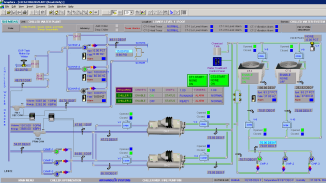Building Sustainability into Control Systems
This slideshow is part of: Melody Baglione
Building Sustainability into Control Systems Courses is a project supported by the National Science Foundation under grant no. DUE 1044830. This project engages mechanical engineering (ME) students by exposing them to relevant, real-world problems that leverage our new Leadership in Energy and Environmental Design (LEED) platinum-certified academic building. Specific objectives include:
- utilizing our state-of-the art Building Management System to incorporate learning opportunities that integrate energy consumption and sustainability, and
- developing new process control laboratory experiments that connect traditional classroom theory to a building control systems theme.
These inductive learning platforms and practical experiments are being incorporated into an ongoing redesign of the ME program that creates a more cooperative and student-centric learning environment. The project will assess student learning outcomes resulting from case-based and experiential learning approaches and disseminate new curricular materials that will be modular and adaptable to a wide range of curricula. A key outcome of this effort is the examination of the role of first-hand experiences and curricular improvements in attracting and retaining a talented, diverse student population in mechanical engineering.
For more see here.





